|
|
|
Sort Order |
|
|
|
Items / Page
|
|
|
|
|
|
|
| Srl | Item |
| 1 |
ID:
141480
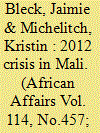

|
|
|
|
|
| Summary/Abstract |
In 2012 Mali faced a crisis disrupting nearly twenty years of democratization – a coup and rebel insurgency. This article investigates policy priorities amongst rural Malians living on the border of state and rebel-controlled territory during the crisis. While academic and policy-making communities have focused largely on Mali's recent and sudden regime and territorial breakdown, the villagers defined the crisis in terms of their unmet needs for public services and infrastructure amidst high food and water insecurity. Concern for the sudden ‘juridical state’ breakdown – the collapse of the democratic regime – was trumped by the focus on long-term ‘empirical state’ breakdown. Using recent Afrobarometer data on diverse dimensions of empirical statehood, we show that the problem of rural neglect emphasized by seminal scholars is persistent not only across Mali, but also across many African countries. The tendency of academics and policy makers to focus on the immediate or more volatile political problems of the coup and rebel insurgency facing the Malian state, while important, risks understating and underestimating the power of slow-moving crises of daily life that are more important to rural citizens.
|
|
|
|
|
|
|
|
|
|
|
|
|
|
|
|
| 2 |
ID:
151836
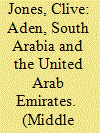

|
|
|
|
|
| Summary/Abstract |
Five decades after withdrawing its troops from Aden for the last time, the decision by the Government of Harold Wilson to abandon the Federation of South Arabia (FSA) and with it, the various tribal potentates that had aligned themselves with this project in state creation continues to generate vociferous debate. For some, any attempt to configure a modern state from a largely tribal field was doomed to fail as internecine conflict; regional rivalries punctured the illusion of a unified Federal identity, let alone a coherent state. For others, it was a lack of British political resolve as well as investment of the necessary treasure that forced the issue and saw London abandon erstwhile allies to an often bloody fate with the emergence of a Marxist-led regime in what became South Yemen after 1967. Yet just three years later, Britain oversaw the creation of the United Arab Emirates (UAE) from a collection of tribal entities, a state creation project that continues to endure. In a series of articles written by leading historians of the region as well as former diplomats, this issue of Middle Eastern Studies sets out to compare and contrast the circumstances and context surrounding the failure of the FSA with the establishment of the UAE, the legacy of which continues to shape the politics and security of the Gulf region in the twenty first century.
|
|
|
|
|
|
|
|
|
|
|
|
|
|
|
|
| 3 |
ID:
046611
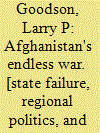

|
|
|
|
|
| Publication |
Seattle, University of Washington Press, 2001.
|
| Description |
xv, 264p.hbk
|
| Standard Number |
0295980508
|
|
|
|
|
|
|
|
|
|
|
|
Copies: C:1/I:0,R:0,Q:0
Circulation
| Accession# | Call# | Current Location | Status | Policy | Location |
| 045816 | 958.1/GOO 045816 | Main | On Shelf | General | |
|
|
|
|
| 4 |
ID:
188826
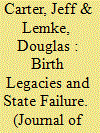

|
|
|
|
|
| Summary/Abstract |
We argue patterns of state failure are influenced by variation in how states emerged as independent political actors. In particular, states with positive birth legacies, those whose emergence required relatively high levels of capacity and legitimacy, should be less likely to experience state failure than countries that experienced less auspicious births. We assess this claim on the universe of states in the international system between 1950 and 2002 with multistate duration models that estimate the probabilities states transition into and out of periods of failure. We find that states with positive birth legacies are less likely to experience state failure and that this relationship is driven by states with positive birth legacies being able to more quickly transition from failure back to being functioning states. Our findings offer evidence that state failure is usefully thought of in the context of state-making processes and show that how states emerge as independent actors influences phenomena central to comparative and international politics.
|
|
|
|
|
|
|
|
|
|
|
|
|
|
|
|
| 5 |
ID:
099447
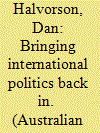

|
|
|
|
|
| Publication |
2010.
|
| Summary/Abstract |
This article argues that the failed-state phenomenon is not unique to the post-cold war era, nor is it uniquely threatening in comparison with other historical periods. The article contends that state failure is not primarily a failure of formal institutions of governance but a subjective condition defined by the great powers. 'Bringing international politics back in' is essential to a clear understanding of the issue for an emerging multipolar international system of the twenty-first century. The article draws on classical realist and critical constructivist perspectives to define state failure before developing a theoretical framework to reconceptualise the issue in a historical and international systemic context. Interpretations of state failure are based on the interplay of contingent transnational threats with the distribution of capabilities in the international system, the pattern of order in the international society, and the sensitivity of the domestic polities of leading actors to risk. The article draws some implications of this for the coming decades of the twenty-first century.
|
|
|
|
|
|
|
|
|
|
|
|
|
|
|
|
| 6 |
ID:
179339
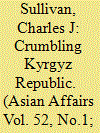

|
|
|
|
|
| Summary/Abstract |
Although Kyrgyzstan has recently withstood two coup d'états (or so-called “revolutions”) and a bout of ethnic violence, the politicization of the legal system by successive presidents portends a troublesome future. The 2017 transition from Almazbek Atambaev to Sooronbai Jeenbekov gave way to the former's arrest and imprisonment. A series of other prior arrests and incarcerations of (former) parliamentarians indicate that Kyrgyzstan's presidents are regularly manipulating the legal system to persecute and neutralize their rivals. This article posits that the repetitive rupturing of legal institutions will usher in an era of heightened illiberalism, elite uncertainty, and the further discrediting of the political system, thereby placing the state on the brink of failure. The mass uprising in response to the October 2020 parliamentary electoral results and most recent coup d'état indicate that the prospects of the Kyrgyz Republic suffering a collapse are real.
|
|
|
|
|
|
|
|
|
|
|
|
|
|
|
|
| 7 |
ID:
138776
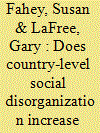

|
|
|
|
|
| Summary/Abstract |
This study examines the effects of a measure of country-level social disorganization on levels of terrorist attacks and fatalities in 101 countries from 1981 to 2010. We measure social disorganization as the presence of state instability: revolutionary and ethnic war, adverse regime change, and genocide. The classic social disorganization perspective posits that individuals experiencing these types of rapid social change will be freed from the institutional and informal restraints that bind them to society, and keep them conforming to social norms and laws. We examine the extent to which this reasoning applies to the number of terrorist attacks and fatalities from terrorist attacks occurring in countries. To control for the possibility that better functioning states are better able to prevent terrorist attacks, we include two measures of state capacity. We find that controlling for state capacity and a wide variety of other variables, social disorganization is consistently associated with increases in terrorist attacks and fatalities. We consider implications of the results for future research and policy.
|
|
|
|
|
|
|
|
|
|
|
|
|
|
|
|
| 8 |
ID:
076950
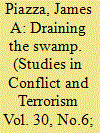

|
|
|
|
|
| Publication |
2007.
|
| Summary/Abstract |
This study empirically evaluates the question of whether or not the promotion of democracy in the Middle East will reduce terrorism, both in terms of terrorist attacks sustained by Middle Eastern countries and in terms of attacks perpetrated by terrorist groups based in Middle Eastern countries. Using a series of pooled, time-series negative binomial statistical regression models on 19 countries from 1972 to 2003 the analysis demonstrates that the more politically liberal Middle Eastern states - measured both in terms of democratic processes and in terms of civil liberties protections - are actually more prone to terrorist activity than are Middle Eastern dictatorships. The study demonstrates, furthermore, that an even more significant predictor of Middle Eastern terrorist attacks is the intensity of state failures, or episodes of severe political instability that limit central government projection of domestic authority, suffered by states in the region. States that are unable to respond to fundamental challenges to political stability posed by internal political strife, ethnic conflict or the phenomenon of "stateless areas," geographic or political spaces within states that eschew central government authority, are significantly more likely to host or sustain attacks from terrorist groups. The findings have implications for current United States antiterrorism policy toward the Middle East and provide a statistical/empirical foundation to previous studies on the relationship between terrorism and state failure.
|
|
|
|
|
|
|
|
|
|
|
|
|
|
|
|
| 9 |
ID:
154480


|
|
|
|
|
| Summary/Abstract |
Piracy off the coast of Somalia has resulted in a steady decline in trade through the Arabian Sea and higher costs of doing business for multiple world regions. The EU has responded to the threat with a large-scale anti-piracy operation in the Horn of Africa, which constitutes the first free-standing Common Security and Defence Policy (CSDP) military operation that is not entirely dependent on North Atlantic Treaty Organization (NATO) planning and assets. The operation is designed to interdict Somali piracy operations across the Gulf of Aden and to keep some of the world’s busiest sea lanes open for reasons of world trade. This article argues that the EU preoccupation with military solutions to the piracy problem, based on interventions through the Somali federal government with an emphasis on security, is insufficient because it fails to address the underlying causes of piracy and misunderstands the Somali socio-cultural-security nexus and the need for practical longer term land-based approaches to development. The reduction of Somali piracy activities can be linked to this increased military response capacity as well as to increased security precautions undertaken by shipping companies, but none of these strategies has succeeded in dismantling piracy networks. They therefore offer only a temporary and costly stopgap measure.
|
|
|
|
|
|
|
|
|
|
|
|
|
|
|
|
| 10 |
ID:
178528
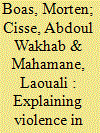

|
|
|
|
|
| Summary/Abstract |
The Tillabéri region in Niger has quickly lapsed into a state of violence and come under the control of ‘violent entrepreneurs’ – that is, non-state armed actors possessing some kind of political agenda, which is implemented in tandem with different types of income-generating activities. Violent entrepreneurs rule by force and violence, but they also distribute resources, provide some level of order and offer protection to (at least parts of) the population in the areas they control, or attempt to control. In many local communities in peripheral areas of the Sahel, these violent entrepreneurs have a stronger presence than international community actors and their national allies. This situation is partly the result of spill-over effects from the war in Mali and local herder-farmer conflicts, but the key factors are the ability of jihadi insurgents to appropriate local grievances and the failure of the state to resist this.
|
|
|
|
|
|
|
|
|
|
|
|
|
|
|
|
| 11 |
ID:
150481
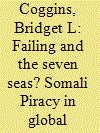

|
|
|
|
|
| Summary/Abstract |
This article reconciles the conflicting evidence on the relationship between governance and maritime piracy at the macro (state) and micro (sub-state) level using original data (2000–2011) and a study of piracy’s emergence in and around the Horn of Africa. It finds a consistent, positive relationship between state weakness and increased piracy production cross-nationally. However, Somali piracy belies the “anarchy as opportunity” mechanism implied by the large-N study. The pirate industry there received substantial support from local authorities, more consistent with a quadratic, “stability-enabled” argument regarding governance. I conclude that each is half-right. At the macro level, anarchy presents permissive conditions for simple banditry, but limits the potential for robust organized crime unless corruptible sub-state authorities exist and can be co-opted. Policy-wise, efficient pirate deterrence programs should concentrate on regions within failed states with this mix of characteristics. Methodologically, the results point to the limitations of existing metrics of state fragility and governance, and recommend that more nuanced measures be used.
|
|
|
|
|
|
|
|
|
|
|
|
|
|
|
|
| 12 |
ID:
154065
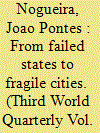

|
|
|
|
|
| Summary/Abstract |
It has become commonplace to claim that cities are becoming conflict zones, or ‘war zones’. This article traces some of the discursive and conceptual shifts that made it possible to define the city as a new frontier for international humanitarian action in states of the Global South. In order to represent cities as humanitarian spaces, concepts of ‘failure’ and ‘fragility’ have been problematised and subjected to reinterpretations that legitimised new strategies applied to the urban realm. I argue that this re-scaling of humanitarian practices enables a de-coupling and inclusion of so called new ‘urban conflicts’ in strategies of global liberal governance. Moving from failed states to fragile cites is a key development to understand changes in the practices that redefine humanitarian spaces today. The definition of urban violence as a new type of conflict informs a new cycle of expansion of the humanitarian order focused on the city. The article analyses the problematisation of concepts of failure and fragility as a decisive move to redefine the boundaries of humanitarian spaces.
|
|
|
|
|
|
|
|
|
|
|
|
|
|
|
|
| 13 |
ID:
159359
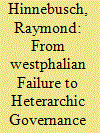

|
|
|
|
|
| Summary/Abstract |
The problematic export of the Westphalian system to MENA is examined, taking Syria as exemplar. The export model is juxtaposed to actual non-lineal trajectories, semi-sovereignty and hybrid or failing states. This is manifested in post-uprising Syria in failing statehood, fragmented and overlapping governance, permeable and collapsing borders, the loss of sovereignty to trans-state movements, “competitive regime-building” between the Asad regime and jihadist warlords, and “competitive interventionism” by external powers filling the governance vacuum with their own proxies. The result is heterarchic zones of limited statehood in which state sovereignty is contested by both international (supra-state) penetration and sub-state fragmentation.
|
|
|
|
|
|
|
|
|
|
|
|
|
|
|
|
| 14 |
ID:
120446
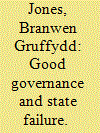

|
|
|
|
|
| Publication |
2013.
|
| Summary/Abstract |
Current international policy discourse routinely characterizes the condition of African states in terms of either 'good governance', on one hand, or 'fragility' and 'failure', on the other. This conceptual vocabulary and analytical approach has become entrenched within the public imagination more broadly, and is reproduced in academic analysis, largely without serious questioning or critique. Some scholars, however, have argued that the entire discourse of 'state failure' should be rejected as a valid approach to understanding, analysis and explanation of social and political conditions in Africa. This position seeks both to demonstrate the analytical and explanatory emptiness of the conceptual framework of 'state failure', and to reject the uncritical adoption of strands of imperial discourse by academic scholars. This article contributes to this position by examining the failed state discourse as a modern form of racialized international thought. It argues that the discourse must be recognized as a contemporary successor to a much longer genealogy of imperial discourse about Africa and other non-European societies.
|
|
|
|
|
|
|
|
|
|
|
|
|
|
|
|
| 15 |
ID:
020623
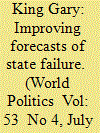

|
|
|
|
|
| Publication |
July 2001.
|
| Description |
623-658
|
|
|
|
|
|
|
|
|
|
|
|
|
|
|
|
| 16 |
ID:
080347
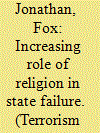

|
|
|
|
|
| Publication |
2007.
|
| Summary/Abstract |
This study examines the extent of religious conflict between 1960 and 2004 in the context of all domestic conflicts in that era based on data from the State Failure dataset. The findings show that until 2002 religious conflicts were a minority of all conflicts, but from 2002 to 2004 they were a majority of all conflicts. This study also examines the extent to which groups belonging to different religious traditions (i.e., Christianity, Islam, etc.) participate in conflict. The specific results on the relative participation in conflict by Christian and Muslim groups depend on the method used to measure conflict. However, no matter how conflict is measured, the results consistently show a rise in Islamic participation in conflict since the late 1970s. Also, for nearly the entire period covered by this study, the majority of religious conflicts involved Muslims. All of this supports contentions that rather than causing religion's demise, modernity has caused a resurgence of religion.
|
|
|
|
|
|
|
|
|
|
|
|
|
|
|
|
| 17 |
ID:
125105
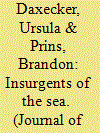

|
|
|
|
|
| Publication |
2013.
|
| Summary/Abstract |
While piracy may evoke romanticized visions of swashbuckling, rum swigging, and skirt chasing pirates hoisting the Jolly Roger, maritime piracy has changed substantially by taking advantage of modernization and substantial upgrading of the weapons, vessels, and weapons it employs. In addition, as documented by the International Maritime Bureau (IMB), the frequency of pirate attacks has increased significantly, with more than 2,600 piracy incidents occurring since 2004. The authors argue that piracy is a result of permissive institutional environments and the lack of legal forms of employment in states' fishing sectors. The authors investigate these arguments empirically using data for all countries with coastlines in the 1995-2007 period. The empirical analyses show that state weakness and reductions in fisheries production values affect piracy as expected. These findings suggest that international efforts in combating piracy should center on improving the institutional environments and labor opportunities driving maritime piracy.
|
|
|
|
|
|
|
|
|
|
|
|
|
|
|
|
| 18 |
ID:
110778
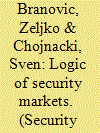

|
|
|
|
|
| Publication |
2011.
|
| Summary/Abstract |
This article presents a theoretical framework with which to discuss how non-state modes of security governance evolve in the context of state failure and/or collapse. To address this issue, we present the logic of security markets, which assumes that the evolution of security governance by non-state groups in failed states is a function of both resource availability and the strategies that armed groups apply to extract resources from the civilian population. Axiomatically, we expect that in the short term the central purpose for the use of force is survival and achieving the ability to finance one's capabilities to use force, although ultimately this also includes the seizure and control of territory. The main argument is that the changing competitive conditions in security markets - which we measure in terms of the total number of violent groups and their organizational design, size and strength - explain the rationales behind the decisions of armed groups either to use violence against the civilian population or to invest in the provision of security.
|
|
|
|
|
|
|
|
|
|
|
|
|
|
|
|
| 19 |
ID:
141232
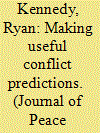

|
|
|
|
|
| Summary/Abstract |
One of the major issues in predicting state failure is the relatively rare occurrence of event onset. This class skew problem can cause difficulties in both estimating a model and selecting a decision boundary. Since the publication of King & Zeng’s studies in 2001, scholars have utilized case-control methods to address this issue. This article builds on the landmark research of the Political Instability Task Force comparing the case-control approach to several other methods from the machine learning field and some original to this study. Case-control methods have several practical disadvantages and show no measurable advantages in prediction. The article also introduces cost-sensitive methods for determining a decision boundary. This explication raises questions about the Task Force’s formulation of a decision boundary and suggests methods for making useful predictions for policy. I find that the decision boundary chosen by the PITF implicitly assumes that the cost of intervention is about 7.7% of the cost of non-intervention when state failure will take place. These findings demonstrate that there is still much work to be done in predicting state failure, especially in limiting the number of false positives. More generally, it suggests caution in using accuracy as a measure of success when significant class imbalance exists in the data.
|
|
|
|
|
|
|
|
|
|
|
|
|
|
|
|
| 20 |
ID:
188020
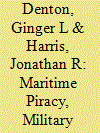

|
|
|
|
|
| Summary/Abstract |
West African security threats have become more frequent in recent years, most notably in the Gulf of Guinea. As increasing quantities of the world’s trade pass through the maritime domain, ship hijackings and other maritime criminal activities have garnered widespread attention from the international community. The International Maritime Bureau reports 785 piracy incidents have occurred in the region since 2000 and current models forecasting worldwide piracy trends have failed to accurately predict maritime crime in all of the West African states. The purpose of this article is to provide an analysis of piracy developments in the Gulf of Guinea. The authors argue that increased military capacity and anocratic regimes lead to increases in piracy while failed states are associated with a decline in such maritime crimes. Data from 2000 to 2016 is used to empirically test this claim. The analysis shows that a state’s military capacity has no impact on the prevalence of piracy events while institutional frameworks and regime type influence the degree and number of maritime attacks off the coast of West Africa. The results imply that institutionally strong and democratic regimes are less likely to experience piracy in the Gulf of Guinea than weak states or anocracies.
|
|
|
|
|
|
|
|
|
|
|
|
|
|
|
|
|
|
|
|
|